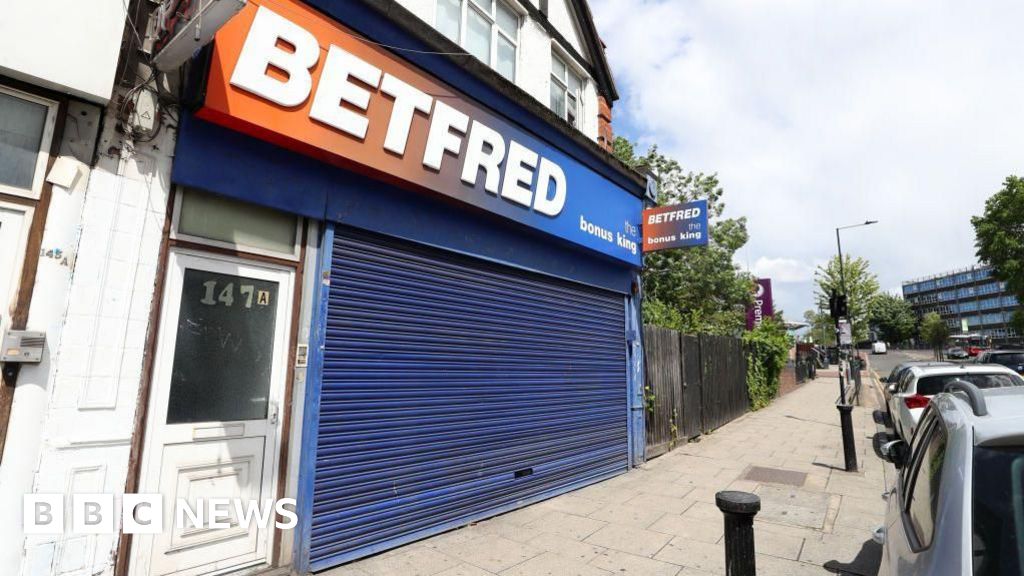Business
Betfred says all its shops may close if Reeves hikes gambling tax

All 1,287 Betfred shops could disappear from the UK High Street if Chancellor Rachel Reeves hikes taxes on gambling firms, the company’s co-founder and chairman has told the BBC.
Fred Done, who set up Betfred in 1967 with his brother, said a closure of that size would put 7,500 jobs at risk.
The billionaire businessman said tax rises were the “biggest threat” to the industry in his 57 years. It echoes similar warnings from other gambling brands.
Increasing taxes on betting firms in the Budget has been suggested to the chancellor. She recently told ITV: “I do think there is a case for gambling firms paying more… they should pay their fair share of taxes and we will make sure that happens.”
Reeves has been encouraged by former Prime Minister Gordon Brown to increase taxes on the gambling sector and use the revenue from that to reduce child poverty.
The Institute for Public Policy Research (IPPR) think tank estimated over the summer that additional taxes on the industry, as high as 50%, could raise £3.2bn.
At the time the Betting and Gaming Council, which represents gambling companies, called Brown’s plan “economically reckless”, saying it would push gamblers into the black market.
Betting companies have resisted calls for taxes to rise. Up to 200 William Hill retail outlets could close if the industry faces higher taxes, its owner Evoke said earlier this month.
Betfred’s Mr Done said that if taxes on UK gambling companies increased he would also feel compelled to close his High Street shops.
“It [tax] doesn’t even need to go up to 50%. If it went up to anywhere like 40% or even 35% there is no profit in the business. We would have to close it down. I’m talking job losses. We’re talking probably 7,500,” he said.
He said 300 of his shops were “currently losing money” and claimed a 5% increase on gambling taxes would raise that number to 430.
“Once the [UK] industry is closed down, it’s gone. People will still bet, but they’ll bet offshore with it. There’s plenty of bookmakers offshore who happen to take the bets, who don’t pay anything to this country,” he said.
Punters’ winnings from gambling are not taxed in the UK, nor is VAT charged on bets. However, the gambling industry pays extra taxes, including:
- a tax of 21% on online casino gaming stakes
- duty of 20% on slots and gaming machines
- general betting duty on sports fixtures of 15%
- general betting duty on horseracing of 15%
Mr Done said recent increases in employer National Insurance Contributions (NICs) and the minimum wage had already added £20m to his company’s costs.
He agreed that, like with banking or buying clothes, customers are increasingly going online, making it inevitable to close betting shops.
Rival firm Paddy Power on Thursday said it would close 57 shops across the UK and Republic of Ireland, citing increasing cost pressures and challenging market conditions.
“Slowly it will go online, but we’re talking, without tax increases, we’ve still got probably 20 years of life on the High Street,” said Mr Done.
“And you know, the UK High Street is being decimated with closures.”
In its most recent annual results, Betfred took in nearly £1bn of revenue, but made an operating profit of just £500,000 after a series of writedowns on its assets.
The family-owned company has bases in the UK, Gibraltar, the US and South Africa, with investment in both online gambling and High Street sports betting.
Critics point to the social and financial harm caused by gambling. Office for Health Improvement and Disparities research from 2023 estimated the excess costs of harmful gambling to be between £1bn and £1.77bn.
Prof Ashwin Kumar, director of research and policy at the IPPR, said higher taxes were needed on the industry, particularly for online betting, to reflect the negative consequences gambling has on some people.
“We know that most of the profits made by gambling companies come from a very small number of gamblers, many of whom are at risk of serious harm. And so we think that the duties should be higher, just like tobacco and alcohol.”
Charity GambleAware, which supports people with gambling addiction, said “further regulation” was needed on advertising to help protect children and young people, as well as to raise awareness about the risks.
But Mr Done argues that UK-based, High Street betting shops provide better safeguards for people with gambling problems, as well as tax revenues, than online and offshore rivals.
As to whether he thinks his appeal to keep taxes as they are will win over the chancellor, Mr Done said “we’re 10 to one against”, which suggests it’s odds on that many betting shops will close.
A HM Treasury spokesperson said: “We do not comment on speculation around future changes to tax policy.”
Business
Stocks hit by Greenland worry and Japan bond slump

Stocks fell sharply while the bond market creaked amid ongoing tension and increased rhetoric over the future of Greenland.
The FTSE 100 index closed down 68.57 points, 0.7%, at 10,126.78 on Tuesday.
The FTSE 250 ended 153.94 points lower, 0.7%, at 22,957.87, and the AIM All-Share closed down 2.35 points, 0.3%, at 801.14.
The threat of tariffs from US President Donald Trump continued to weigh heavy on European markets, while screens on Wall Street were a sea of red as trading resumed following Monday’s public holiday.
In European equities on Tuesday, the CAC 40 in Paris closed down 0.6%, while the DAX 40 in Frankfurt ended 1.0% lower.
In New York, financial markets were lower at the time of the London equity market close.
The Dow Jones Industrial Average was down 1.3%, the S&P 500 was 1.4% lower and the Nasdaq Composite faltered 1.5%.
Mr Trump said at the weekend that, from February 1, Britain, Denmark, Finland, France, Germany, the Netherlands, Norway and Sweden would be subject to a 10% tariff on all goods sent to the US until Denmark agrees to cede Greenland.
The announcement drew angry charges from US allies who are pondering countermeasures.
“Trade concerns are now front and centre, with European leaders pushing back against Washington’s stance and reportedly discussing countermeasures,” said David Morrison, senior market analyst, at Trade Nation.
“The potential use of the EU’s Anti-Coercion Instrument has added to market unease, particularly for export-heavy sectors such as autos and luxury goods, which have already come under pressure.”
Mr Morrison pointed to apparent split over how Europe should respond to Mr Trump’s threats.
“While UK Prime Minister Starmer pursues a softly-softly approach, insisting that jaw-jaw is better than war-war, French President (Emmanuel) Macron favours a more aggressive approach and wants to fight US tariffs with European ones,” he said.
European Commission president Ursula von der Leyen cautioned that Mr Trump risked plunging US ties with the EU into a “downward spiral”.
While Mr Macron warned against US attempts to “subordinate Europe”, and blasted as “unacceptable” Mr Trump’s threats to impose tariffs of up to 25% on countries opposed to his Greenland plans.
Reports suggested Europe could consider retaliatory tariffs and also possibly a concerted strategy to offload US treasury bonds.
The yield on the US 10-year treasury was quoted at 4.28%, widening from 4.21% on Friday.
The yield on the US 30-year treasury was quoted at 4.91%, stretched from 4.82% on Friday.
The focus now switches to Davos, which Mr Trump is due to address on Wednesday.
“Escalation or softening in tone seems likely to set the direction for European risk assets in the days ahead,” said Mr Morrison.
Adding to the bond market angst was a sharp sell-off in Japan.
Kathleen Brooks at XTB Research said while the sell off in long end bond yields was global, the biggest move “by far” was in Japan.
The 30-year Japanese bond yield rose 26 basis points, as investors “fret about an expansionary fiscal policy if PM (Sanae) Takaichi wins the February 8 election,” she pointed out.
“The Greenland issue is taking the headlines today, however, in the long term, the insane rise in Japanese bond yields could have a bigger global effect,” Ms Brooks suggested.
“Japan is central to global capital flows, if there is disruption in Japanese financial markets then this could have a knock-on effect on global capital flows and overall risk sentiment,” she added.
Ms Brooks said the risk is that the sell off in bonds causes “something to break, either a Japanese bank or fund gets into trouble like Silicon Valley Bank back in 2023, which is why it is worth watching the Japanese bond market as well as the Trump show this week.”
The pound was quoted higher at 1.3462 dollars at the time of the London equities close on Tuesday, compared to1.3428 dollars on Monday.
The euro stood at 1.1733 dollars, higher against 1.1643 dollars.
Against the yen, the dollar was trading at 157.95 yen, lower from 158.11 yen.
In London, analysts weighed data which pointed to a cooling labour market and a slowing in average wage growth.
According to the Office for National Statistics, the jobless rate was 5.1% in the three months to November, unchanged from the three months to October.
This came slightly above the FXStreet-cited market consensus, which had pencilled in a slight fall in unemployment to 5.0%.
The ONS said pay-rolled employees in the UK fell by 155,000, or 0.5%, on-year in November, and fell by 33,000, or 0.1%, on-month.
Annual growth in regular earnings, excluding bonuses, was 4.5% in the three months to November, slowing from 4.6% in the three months to October.
Annual average regular earnings growth was 7.9% for the public sector and 3.6% for the private sector.
“Today’s labour market data showed easing wage pressures, weak employment and rising redundancies. We judge this to be consistent with our view that the labour market continues to ease and has further to go in coming months,” said analysts at Barclays.
Informa led the blue chip risers, up 4.6%, after reporting “strong trading” in the fourth quarter.
The London-based events, digital services, and academic publishing business expects revenue of at least £4.0 billion in 2025, up 13% from £3.55 billion in 2024, representing underlying revenue growth of 6.3%.
On the FTSE 250, the weak labour statistics weighed on PageGroup, down 3.8%, and Hays, down 0.3%.
Morgan Stanley reiterated an ‘underweight’ stance on both recruitment firms and cut share price targets.
Elsewhere, Funding Circle jumped 14% as it reported stronger-than-expected revenue and profit growth in 2025, achieving its financial 2026 revenue target a year earlier.
The London-based lending platform focused on small and medium enterprises said revenue for the year was about £204 million, up 28% from a year earlier, beating market expectations of £191 million.
Profit before tax rose to around £20 million from £3 million in 2024, also ahead of consensus of £17 million.
Wise Group jumped 15% as analysts raised profit forecasts amid strong third quarter trading.
The London-based money transfer services provider expects full-year underlying income to be around the middle of its guided range of 15% and 20% growth, and expects underlying pre-tax profit margin for financial 2026 to be “towards the top” of the guided 13% to 16% target range.
JPMorgan analyst Craig McDowell said the underlying income forecast was better than consensus at 16.3%, while the underlying pre-tax profit margin projection was ahead of consensus at 14.3%.
McDowell predicted 9% to 12% pretax profit upgrades for financial 2026, while Bank of America was more bullish, raising numbers by 20%.
Brent oil traded higher at 64.89 dollars a barrel on Tuesday, down from 64.13 dollars late on Monday.
Gold was quoted at 4,742.56 dollars an ounce on Tuesday, up from 4,671.76 dollars on Monday.
The biggest risers on the FTSE 100 were Informa, up 39.8 pence at 912.2p, Haleon, up 11.8p at 372.9p, Endeavour Mining, up 112.0p at 4,208.0p, Rentokil Initial, up 8.0p at 461.7p and Melrose Industries, up 9.0p at 625.8p.
The biggest fallers on the FTSE 100 were Mondi, down 41.2p at 845.4p, Beazley, down 44.0p at 1,126.0p, Pershing Square Holdings, down 134.0p at 4,442.0p, Land Securities, down 19.0p at 635.0p and Bunzl, down 57.0p at 1,989.0p.
Wednesday’s global economic calendar has UK inflation figures and Canadian producer price inflation data.
Wednesday’s UK corporate calendar has trading statements from luxury goods manufacturer Burberry, sports retailer JD Sports, electrical retailer Currys and pub chain JD Wetherspoon.
– Contributed by Alliance News
Business
Netflix agrees revised all-cash deal for Warner Bros studios

Netflix has significantly increased its all-cash offer to acquire Warner Bros Discovery’s studio and streaming business, intensifying an ongoing takeover battle with rival Paramount Skydance.
The revised bid aims to secure Warner Bros’ extensive film and television library, alongside its premium HBO Max streaming service, in a move that could reshape the entertainment landscape.
In December, Netflix agreed to pay $23.25 in cash, $4.50 (£3.35) worth of Netflix stock per share to buy Warner Bros assets.
The deal valued the business at around $82.7bn (£61.5 bn). However, shares in Netflix have dropped by almost 15 per cent since the deal was first announced.
The US-based streaming giant has said it will now offer $27.75 (£20.64) per share in cash to buy the business, which will include Warner Bros’ extensive library of film and TV rights, as well as its HBO Max streaming service.
Analysts have said the new terms are favourable for investors in Warner Bros Discovery.
Despite the improved financial terms, Warner Bros Discovery continues to back Netflix over a competing bid from Paramount Skydance.
The rival studios and media giant had put forward an offer of $30 per share in cash, but crucially, this was for the entire Warner Bros Discovery company, rather than just its studio and streaming divisions, highlighting a key difference in the acquisition strategies.
David Zaslav, president and chief executive of Warner Bros Discovery, expressed his enthusiasm for the impending merger.
He stated: “Today’s revised merger agreement brings us even closer to combining two of the greatest storytelling companies in the world and with it even more people enjoying the entertainment they love to watch the most. By coming together with Netflix, we will combine the stories Warner Bros has told that have captured the world’s attention for more than a century and ensure audiences continue to enjoy them for generations to come.”

Greg Peters, Netflix’s co-chief executive, underscored the strategic and financial benefits of the amended agreement.
He commented: “By amending our agreement today, we are underscoring what we have believed all along: not only does our transaction provide superior stockholder value, it is also fundamentally pro-consumer, pro-innovation, pro-creator and pro-growth. Our revised all-cash agreement demonstrates our commitment to the transaction with Warner Bros and provides WBD stockholders with an accelerated process and the financial certainty of cash consideration, while maintaining our commitment to a healthy balance sheet and our solid investment grade ratings.”
The agreed deal is contingent on Warner Bros Discovery completing a proposed spin-off of its cable channels, which include CNN, TBS, and TNT Sports in the UK.
Business
India’s Core Industries Grow 3.7% In December 2025, Cement Tops List

Last Updated:
India’s Index of Eight Core Industries rose 3.7 percent in December 2025, led by cement and steel growth, while oil and gas output declined.

Infrastructure-Linked Sectors Push Core Index Higher in December
India’s core industrial sectors showed stronger momentum in December 2025, with the Index of Eight Core Industries (ICI) rising 3.7 per cent year-on-year, according to provisional government data. This marks an improvement from November’s final growth rate of 2.1 per cent, signalling a mild recovery in key production segments.
The eight core industries together account for 40.27 per cent of the weight of the Index of Industrial Production (IIP), making them a crucial indicator of overall industrial health.
Cement, Steel Lead the Growth
Cement and steel emerged as the strongest performers in December. Cement production jumped 13.5 per cent, reflecting steady demand from infrastructure and construction activity. Steel output also remained robust, rising 6.9 per cent during the month.
Electricity generation increased by 5.3 per cent, pointing to sustained power demand from industry and households. Fertilizer production grew 4.1 per cent, offering support to the agricultural sector, while coal output rose 3.6 per cent, helping ease supply pressures.
Oil and Gas Remain a Weak Spot
In contrast, the oil and gas segments continued to struggle. Crude oil production declined by 5.6 per cent, while natural gas output fell 4.4 per cent in December compared to the same month last year. Petroleum refinery production also slipped 1.0 per cent, highlighting ongoing operational and supply-side challenges in the energy sector.
Cumulative Growth Still Modest
For the April–December 2025-26 period, the cumulative growth of the core industries stood at 2.6 per cent, slightly muted despite strong gains in cement and steel. Steel recorded a sharp 9.5 per cent cumulative growth, while cement rose 8.8 per cent.
However, coal, crude oil, and natural gas saw cumulative declines, which weighed on the overall index.
January 20, 2026, 18:31 IST
Read More
-

 Tech1 week ago
Tech1 week agoNew Proposed Legislation Would Let Self-Driving Cars Operate in New York State
-

 Entertainment1 week ago
Entertainment1 week agoX (formerly Twitter) recovers after brief global outage affects thousands
-

 Sports5 days ago
Sports5 days agoPak-Australia T20 series tickets sale to begin tomorrow – SUCH TV
-

 Politics4 days ago
Politics4 days agoSaudi King Salman leaves hospital after medical tests
-

 Fashion3 days ago
Fashion3 days agoBangladesh, Nepal agree to fast-track proposed PTA
-

 Business4 days ago
Business4 days agoTrump’s proposed ban on buying single-family homes introduces uncertainty for family offices
-

 Tech5 days ago
Tech5 days agoMeta’s Layoffs Leave Supernatural Fitness Users in Mourning
-

 Tech6 days ago
Tech6 days agoTwo Thinking Machines Lab Cofounders Are Leaving to Rejoin OpenAI





